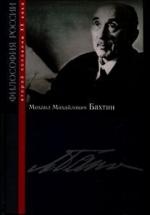|
This section contains 823 words (approx. 3 pages at 300 words per page) |

|
BAKHTIN, M. M. Mikhail Mikhailovich Bakhtin (1895–1975) was a literary critic, philosopher, and leading Russian humanist. He was banished in 1929 to Kazakhstan, but his work was rediscovered after World War II and introduced to Europeans by Julia Kristeva and others. To Bakhtin, perhaps more than anyone, is owed the current attention to intertextuality, the otherness of others' voices, insistence on the moral and epistemological significance of differences, and "dialogism."
A classically trained linguist, Bakhtin challenged Russian formalist followers of Ferdinand de Saussure, insisting that basic speech units are not phonemes or words but specific, often "double-voiced," utterances instantiating historical matrices. Apprised of developments in the arts, sciences, and philosophy by fellow members of "the Bakhtin circle," he anticipated Ludwig Wittgenstein on "private language," dismissed as "monological" all religious and secular ideological systems, and rejected formulaic dialectics.
Bakhtin made his name with a 1929 study of Fyodor...
|
This section contains 823 words (approx. 3 pages at 300 words per page) |

|


